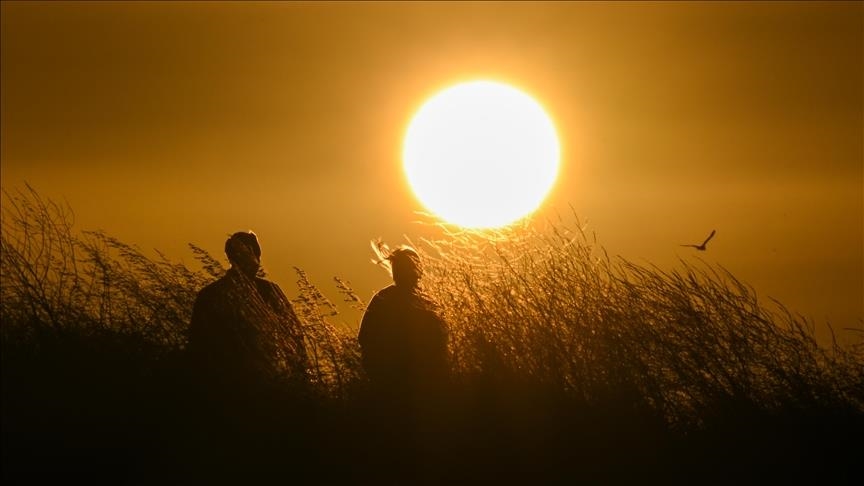West failing to deliver on most climate change needs, warn experts
COP28 reaching end in Dubai as countries try to hammer out final text

ISTANBUL
As the UN climate summit in Dubai nears its end, country delegations are trying to hammer out the event’s final text, with all eyes on whether it will demand solid steps to speed up the fight against climate change or fall short of expectations.
During the COP28 conference, which will continue until Tuesday in the emirate’s Expo City, decisionmakers — especially those representing the heavily industrialized and heavily emitting Western nations — are being urged to spearhead the green transition, from clean energy deployment to helping developing countries make progress with funding and other means of support.
But Kathleen Miller, a retired senior research associate from the federally-funded National Center for Atmospheric Research (NCAR) in the US, and Andrew Ciacci, a climate change expert from the international think tank Crisis Group, painted a grim picture of the efforts coming from the West as the climate crisis deepens.
“I can only say that the global community, and especially nations with large emissions, have been very slow to take effective action to mitigate climate change or to plan seriously for dealing with its impacts,” Miller said in an interview with Anadolu.
“Our understanding of the seriousness of the threats is rapidly increasing,” she said, adding that it is now “more widely shared by individuals likely to be most directly affected.”
“But that has not yet translated into a sufficiently robust and coordinated global program to reduce emissions of greenhouse gases,” warned Miller, who voiced doubts that COP28 would yield any “sufficient progress.”
Ciacci offered a similarly bleak outlook on the fight against climate change, with the exception of the transition to renewable energy.
“I’m optimistic about renewables and pessimistic about everything else,” he said, pointing to advances in recent years. But this, according to him, will not be enough to keep global temperatures at safe levels.
On the goal of limiting warming to 1.5C, he said “it is hard to be positive when emissions are continuing unabated.”
US pledge ‘peanuts compared to what’s needed’
Ciacci blasted the US for its remarkably low pledge for the UN’s Loss and Damage Fund, which was set up to provide financing for countries hit hard by the catastrophic effects of climate change.
“The United States, the biggest historical emitter, only gave $24.5 million, which is peanuts compared to what's needed,” he said, adding that Washington had the “responsibility” to pledge much more for the fund.
“We have a divided government in Washington, where the Democrats have the White House and the Senate, but not the House of Representatives. So, you’ve seen this with Ukraine aid. You've seen this even for Israel.
“There just is no political will or minimal political will,” Ciacci said, lamenting that even as internal politics have become an obstacle in fighting climate change, Europe and the US both consume more energy “than ever.”
“You know, the United States has a domestic Inflation Reduction Act, which will aim to cut emissions by a little less than 50% by 2030. So that's good. But in terms of actually stopping the drilling and consuming, Europe and the US continue consuming more than ever,” he said.
West’s contradiction
Ciacci also touched upon the contradiction that arises from the fact that industrialized Western countries are investing in renewable energy without reducing their emissions to acceptable levels.
It is “absolutely right” to call this dichotomy a contradiction, the expert said, adding that “there are a variety of factors at play.”
“So, number one is climate finance, which is notoriously loosely defined by the UN. There are no standards of what it means. It includes kind of private, public, multilateral finance for emissions reductions or kind of adaptation to climate change,” he said.
“Number two, the war in Ukraine, the post-COVID supply chain shocks, all of that. Obviously, energy independence has been a huge shift for developed economies,” Ciacci added.
While criticizing world leaders over their performance in fighting climate change, he did acknowledge that some progress has been made in renewables, though little else:
“You see, in the G7 and other prominent international meetings, there are usually goals to triple the amount of renewable energy use. When US President Joe Biden and Chinese President Xi Jinping met in San Francisco, one of the things they agreed upon was tripling renewable energy capacity.”
“They’re kind of having their cake and eating it too.”
“They get to emit as much as they want, but they also get to say that they're committing to climate goals,” Ciacci explained as he criticized Western countries for not providing enough finances to less wealthy countries that are vulnerable to climate change.
Reducing emissions crucial for net zero
According to him, even though renewables are important in the fight against climate change, reducing emissions is also a must in reaching the goal of net zero.
“Getting to net zero requires, obviously, two things: investing in renewables and also stopping emissions and pollution,” he said.
While not absolutely hopeless, Ciacci said he was “really, really skeptical” that fossil fuel consumption would be tamed.
What has been achieved in terms of progress for the implementation of the 2015 Paris Agreement is by no means enough, Ciacci added, underlining that results have been “absolutely dismal.”
“I think that, in addition to failing to achieve lower emissions and reduction, and failing to provide finance, failure to adequately identify and respond to the needs of conflict-affected countries for climate action should be acknowledged and should be something the day commit to reporting on and accounting their action on future COP conferences,” he said.
Anadolu Agency website contains only a portion of the news stories offered to subscribers in the AA News Broadcasting System (HAS), and in summarized form. Please contact us for subscription options.

